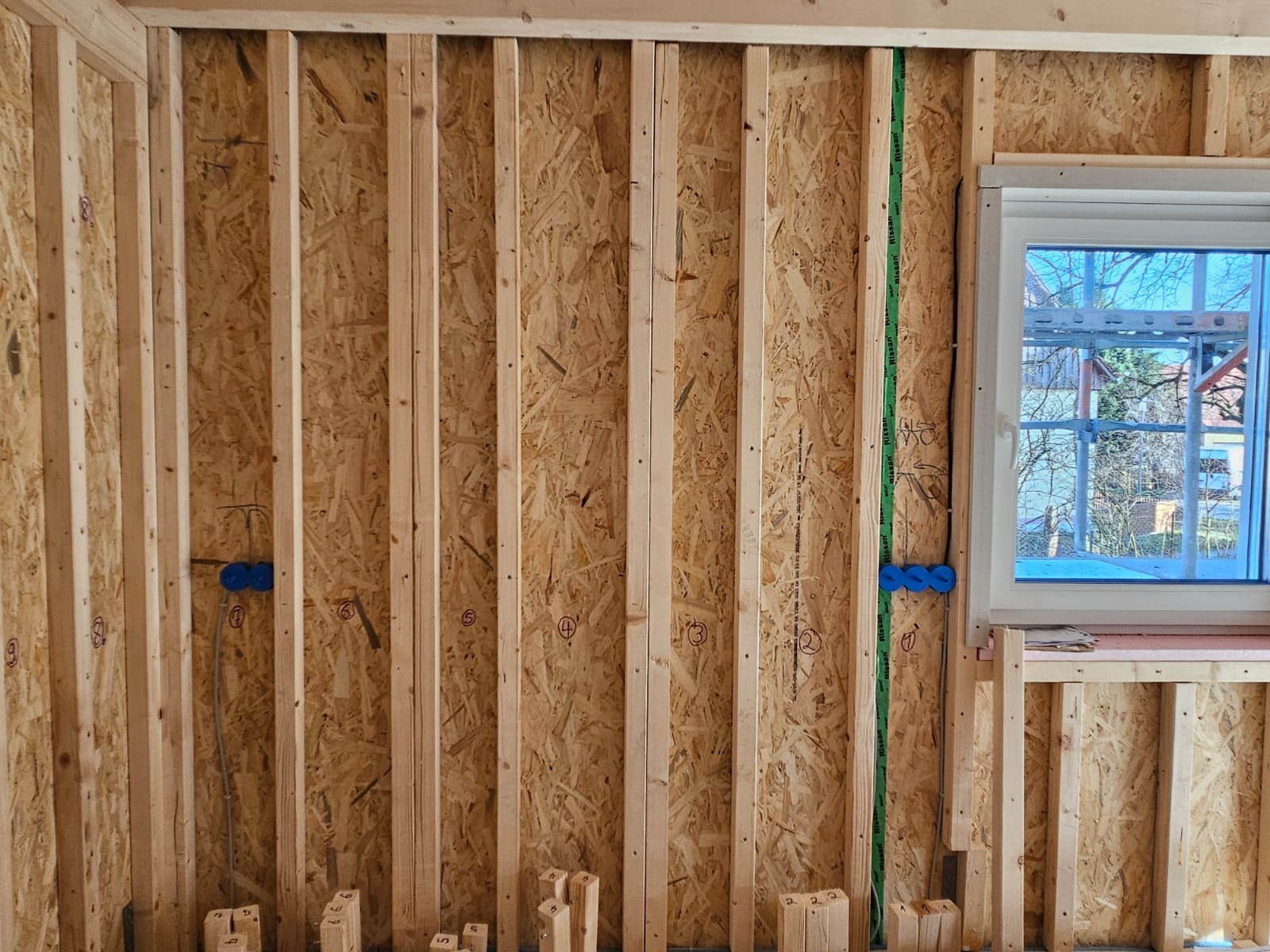Hey!
Currently doing drywall myself and I am using 6x6 cm squared timber around my outside walls.
The problem is they aren’t as stable as the other walls inside the house because of the 6x6 cm squared timbers that are about 30cm distance from each other.
I will screw my plasterboards on the squared timber and only one plasterboard, not two.
I have two pictures of what my construction looks like from far and one from close.
Maybe someone can give me advice before I install the plasterboard onto it.
The only problem I currently see is finding the subconstruction once I put the plasterboards back on. But other than that, if I find them can I install the cabinets safely?
In this thread: OP scaring the Americans because they think what they see in OP’s pictures is the extent of the wall.
If fact, OP is just building out from an existing wall that is behind the OSB in his pictures.
Grogon, ask a local carpenter. I don’t think Americans understand your German construction.
Sarry buddy but yor camment ain’t upda code. Gatta rip it out n stard agin
I’ll answer this one in German since this is my time to shine. Let me just say, the wall is perfectly fine, what we see is just another layer of OSB board for ease of installation on top of the actual wall behind it (which is well framed and insulated).
Dies ist ein sehr unterhaltsamer thread fuer mich, da ich beide Seiten verstehen kann.
Auf der Webseite von Wolf Haus ist die Installationsebene aus OSB zu sehen, die angegebene Punktlast ist 70kg pro Schraube. Wenn du sicherstellst, das deine Schrauben durch die Kanthoelzer in die OSB-Platte gehen, solltest du dich auf diese Angaben verlassen koennen, also eine Schraube haelt dann 70kg.
Deutschland hat selbstverstaendlich auch eine Norm fuer Kuechenmoebel, DIN 68930. Da bekommst du ein Gefuehl dafuer, wie schwer Kuechenschraenke werden koennen. Die Nachbarn in der Schweiz verwenden die Norm SN EN 14749, zum Vergleich. Es ist nicht ungewoehnlich, einen Schrank (wall cabinet) mit 120kg Belastung zu testen.
Beachte bitte auch die Distanz der Schrauben, man darf nicht zu nah oder zu weit setzen. Ich habe das hier auf Deutsch gefunden:
https://www.huettemann.de/lagerkatalog/download/osb4_belastung.pdf
Ich wuerde immer mit einem margin zur Sicherheit rechnen, vielleicht 20%. Eine Schraube haelt dann also 0.8x70kg = 56kg. Wenn du die Distanzen beachtest und dir das Gewicht deines Schrankes ausrechnest und auf entsprechend viele Schrauben verteilst, solltest du safe sein.
Ich gehe natuerlich davon aus, das die Installationsebene von Wolf Haus fachgerecht konstruiert wurde.
Aw come on! I want to learn! I just don’t want to learn German first.
Edit: D’oh! I had missed the context. All good.
Yeah, but they made the thread and mentioned not speaking English well enough and they were really getting confused and anxious by a bunch of us claiming the only way to turn this situation around is to demolish the building - at that point, some helpful reassurance was in order.
The gist of what I said was: the wall is fine, the manufacturer assures a point load of 70kg for the installation layer (so basically 70kg per screw), looking at some local regulations will give you an idea of how heavy a kitchen wall cabinet can get (going at it from this angle is helpful in case you need to discuss liabilities at some point), distribute that load over screws mounted at proper distances, add a safety margin and you should be good.
Super danke !!! : )
There’s about one person in this thread that knows what is going on. Ignore pretty much everyone else.

It didnt allow me to post two pictures.

Are those studs not sitting on a plate?
Yeah there is so much crazy shit going on in these pictures I am doubting my own understanding and I was a rough carpenter for several years.
Why are the studs on the flat? Where the hell is that sill plate? No headers over the windows? No cripples under the windows? Is that stud next to the window opening cut at the bottom? Why are the studs spaced so… creatively
I could probably spot a few more but I honestly think I just don’t know what this building is or where it is. Clearly not in US and maybe it’s a shed or something and not a dwelling. Too much I don’t know to talk shit.
Edit: is there like an actual structural wall on the exterior that we cannot see? Maybe all this stuff is just to provide structure for drywall and electric. That would maybe make sense.
From the links he sent, it looks like he’s just building a non-structural insulating wall on the interior which allows for running electrical lines.
Holy shit, is that load bearing plywood on the far wall (with the rectangle window).
My friend, you need help from someone that knows what they are doing and familiar with local codes before proceeding any further.
They are not American, Germans build way different so how they do things does not make sense without understanding what is going on.
Not just germans, aussie here, assumed that was internal walls (which differ from external). Seen a few double brick/ concrete framed out like that
Mind you our building standards have gone down the shitter since the 90’s…




